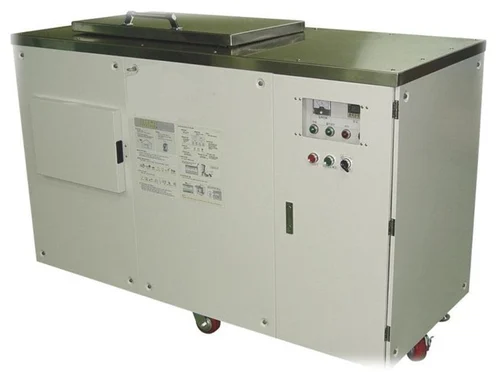OWC Machine Manufacturers
OWC Machine Manufacturers in India

OWC Machine: A Comprehensive Guide to Organic Waste Conversion
The challenge of managing organic waste has grown in significance over the years, with increased urbanization and a heightened focus on sustainability. Organic Waste Converter (OWC) machines have emerged as a crucial tool in addressing this challenge, offering an efficient and eco-friendly solution for converting organic waste into valuable compost. This article will explore the ins and outs of OWC machines, detailing their benefits, operation, and why they are an essential part of modern waste management practices.
What is an OWC Machine?
An Organic Waste Converter (OWC) machine is a device designed to process organic waste and transform it into compost. This compost can then be used to enrich soil, making it a valuable resource for agriculture, gardening, and landscaping. OWC machines are designed to handle various types of organic waste, including food scraps, garden waste, and other biodegradable materials, making them versatile tools in the fight against waste.
How Does an OWC Machine Work?
OWC machines operate through a process that mimics natural decomposition, but in a controlled environment and at a much faster rate. Here’s a step-by-step look at how these machines typically work:
1. Waste Collection and Segregation : The first step in the process is collecting and segregating organic waste. This waste can include kitchen scraps, fruit and vegetable peels, garden clippings, and other biodegradable materials. Segregating the waste ensures that only organic material is processed, which is crucial for producing high-quality compost.
2. Shredding and Mixing : Once the waste is collected, it is shredded into smaller pieces to accelerate the decomposition process. OWC machines often have built-in shredders that break down the waste, making it easier for microorganisms to digest the material. After shredding, the waste is thoroughly mixed to ensure uniform decomposition.
3. Decomposition : The shredded and mixed waste is then placed in the composting chamber, where the actual decomposition occurs. OWC machines are equipped with mechanisms to maintain optimal conditions for composting, including temperature control, moisture regulation, and aeration. These conditions promote the growth of microorganisms that break down the organic matter, turning it into nutrient-rich compost.
4. Compost Collection : After a few weeks, the decomposition process is complete, and the organic waste has been transformed into compost. The compost is then collected from the machine and can be used to enhance soil fertility, whether for agricultural purposes, landscaping, or home gardening.
Benefits of Using an OWC Machine
1. Waste Reduction : OWC machines significantly reduce the volume of waste that ends up in landfills. By converting organic waste into compost, these machines help decrease the amount of waste that requires disposal, easing the burden on landfill sites and reducing the environmental impact of waste management.
2. Sustainability : Using an OWC machine promotes sustainability by recycling organic waste into a valuable resource—compost. Composting reduces the need for chemical fertilizers, which can have harmful effects on the environment, and helps maintain healthy soil, which is crucial for sustainable agriculture.
3. Cost-Effectiveness : In addition to environmental benefits, OWC machines can also be cost-effective. By reducing the amount of waste that needs to be collected, transported, and disposed of, businesses and municipalities can save on waste management costs. Additionally, the compost produced can be used to enrich soil, reducing the need for purchasing fertilizers.
4. Eco-Friendly Operation : OWC machines are designed to operate with minimal environmental impact. They consume less energy compared to traditional waste disposal methods, and the composting process itself is natural and chemical-free, making it an eco-friendly solution for waste management.
Our Products
Applications of OWC Machines
1. Residential Use : For individuals and families, OWC machines provide a convenient way to manage kitchen and garden waste. Compact models are available that are designed for home use, allowing households to convert their organic waste into compost for use in their gardens or community spaces.
2. Commercial Use : Restaurants, hotels, and other businesses that generate large amounts of organic waste can benefit from commercial-grade OWC machines. These machines can handle higher volumes of waste, making them ideal for businesses looking to adopt sustainable waste management practices.
3. Municipal Use : Municipalities and local governments can implement OWC machines as part of their waste management strategies. By providing community composting facilities or encouraging the use of OWC machines at the household level, municipalities can significantly reduce the amount of organic waste that ends up in landfills.
4. Agricultural Use : Farmers and agricultural businesses can use OWC machines to manage crop residues and other organic waste. The compost produced can be used to improve soil health and boost crop yields, contributing to more sustainable agricultural practices.
Choosing the Right OWC Machine
1. Capacity : Consider the amount of waste you generate daily. OWC machines come in various capacities, so it’s essential to choose one that can handle your waste volume efficiently without overloading the system.
2. Space Availability : The size of the OWC machine is another important consideration. For residential use, compact models are available that require minimal space. For commercial or municipal use, larger machines may be necessary, so ensure you have adequate space for installation.
3. Features : Different OWC machines come with various features, such as automated controls, energy-efficient operation, and advanced composting technology. Consider which features are most important to you, whether it’s ease of use, energy efficiency, or speed of composting.
4. Cost : While the initial investment in an OWC machine can be significant, it’s important to consider the long-term savings and benefits. Compare different models based on their cost, features, and the value they offer in terms of waste management efficiency.
Maintenance and Care of OWC Machines
1. Regular Cleaning : Keep the machine clean by removing any residual waste and compost regularly. This helps prevent the buildup of bacteria and odors and ensures the machine operates efficiently.
2. Monitor Composting Conditions : Ensure that the composting conditions inside the machine are optimal. Regularly check the temperature, moisture levels, and aeration to ensure that the composting process is proceeding smoothly.
3. Service and Repairs : Like any machine, OWC machines may require occasional servicing and repairs. Follow the manufacturer’s recommendations for routine maintenance, and address any issues promptly to avoid breakdowns.
Conclusion
Organic Waste Converter (OWC) machine manufacturers are an innovative and sustainable solution to the growing challenge of organic waste management. By efficiently converting organic waste into valuable compost, these machines play a crucial role in promoting sustainability, reducing environmental impact, and supporting eco-friendly practices in various settings.
OWC Machine Use For :-
- Hotels
- Temples
- Hospitals
- APMC Markets
- Clubs & Resorts
- Industrial Canteens
- Municipal Corporations
- Building Clusters in lane
- Large Housing Complexes
